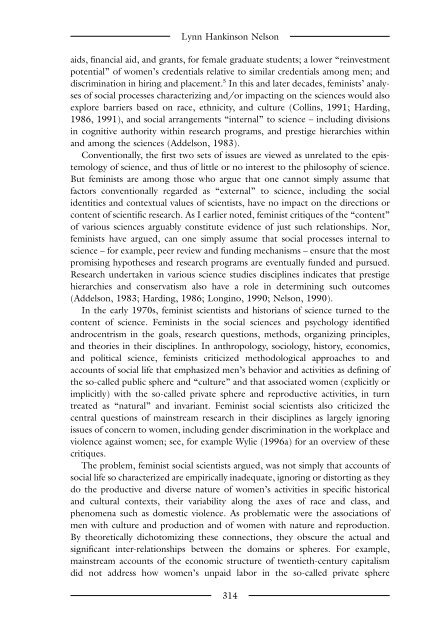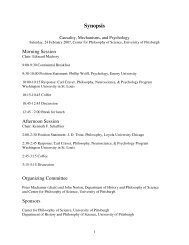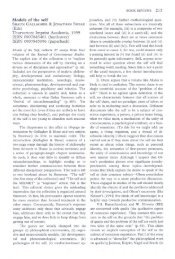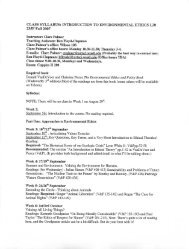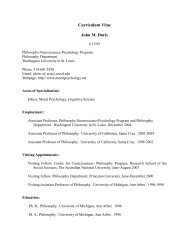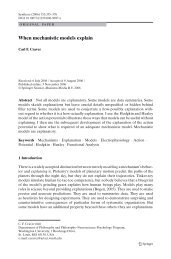The Blackwell Guide to the Philosophy of Science - The Department ...
The Blackwell Guide to the Philosophy of Science - The Department ...
The Blackwell Guide to the Philosophy of Science - The Department ...
You also want an ePaper? Increase the reach of your titles
YUMPU automatically turns print PDFs into web optimized ePapers that Google loves.
Lynn Hankinson Nelson<br />
aids, financial aid, and grants, for female graduate students; a lower “reinvestment<br />
potential” <strong>of</strong> women’s credentials relative <strong>to</strong> similar credentials among men; and<br />
discrimination in hiring and placement. 5 In this and later decades, feminists’ analyses<br />
<strong>of</strong> social processes characterizing and/or impacting on <strong>the</strong> sciences would also<br />
explore barriers based on race, ethnicity, and culture (Collins, 1991; Harding,<br />
1986, 1991), and social arrangements “internal” <strong>to</strong> science – including divisions<br />
in cognitive authority within research programs, and prestige hierarchies within<br />
and among <strong>the</strong> sciences (Addelson, 1983).<br />
Conventionally, <strong>the</strong> first two sets <strong>of</strong> issues are viewed as unrelated <strong>to</strong> <strong>the</strong> epistemology<br />
<strong>of</strong> science, and thus <strong>of</strong> little or no interest <strong>to</strong> <strong>the</strong> philosophy <strong>of</strong> science.<br />
But feminists are among those who argue that one cannot simply assume that<br />
fac<strong>to</strong>rs conventionally regarded as “external” <strong>to</strong> science, including <strong>the</strong> social<br />
identities and contextual values <strong>of</strong> scientists, have no impact on <strong>the</strong> directions or<br />
content <strong>of</strong> scientific research. As I earlier noted, feminist critiques <strong>of</strong> <strong>the</strong> “content”<br />
<strong>of</strong> various sciences arguably constitute evidence <strong>of</strong> just such relationships. Nor,<br />
feminists have argued, can one simply assume that social processes internal <strong>to</strong><br />
science – for example, peer review and funding mechanisms – ensure that <strong>the</strong> most<br />
promising hypo<strong>the</strong>ses and research programs are eventually funded and pursued.<br />
Research undertaken in various science studies disciplines indicates that prestige<br />
hierarchies and conservatism also have a role in determining such outcomes<br />
(Addelson, 1983; Harding, 1986; Longino, 1990; Nelson, 1990).<br />
In <strong>the</strong> early 1970s, feminist scientists and his<strong>to</strong>rians <strong>of</strong> science turned <strong>to</strong> <strong>the</strong><br />
content <strong>of</strong> science. Feminists in <strong>the</strong> social sciences and psychology identified<br />
androcentrism in <strong>the</strong> goals, research questions, methods, organizing principles,<br />
and <strong>the</strong>ories in <strong>the</strong>ir disciplines. In anthropology, sociology, his<strong>to</strong>ry, economics,<br />
and political science, feminists criticized methodological approaches <strong>to</strong> and<br />
accounts <strong>of</strong> social life that emphasized men’s behavior and activities as defining <strong>of</strong><br />
<strong>the</strong> so-called public sphere and “culture” and that associated women (explicitly or<br />
implicitly) with <strong>the</strong> so-called private sphere and reproductive activities, in turn<br />
treated as “natural” and invariant. Feminist social scientists also criticized <strong>the</strong><br />
central questions <strong>of</strong> mainstream research in <strong>the</strong>ir disciplines as largely ignoring<br />
issues <strong>of</strong> concern <strong>to</strong> women, including gender discrimination in <strong>the</strong> workplace and<br />
violence against women; see, for example Wylie (1996a) for an overview <strong>of</strong> <strong>the</strong>se<br />
critiques.<br />
<strong>The</strong> problem, feminist social scientists argued, was not simply that accounts <strong>of</strong><br />
social life so characterized are empirically inadequate, ignoring or dis<strong>to</strong>rting as <strong>the</strong>y<br />
do <strong>the</strong> productive and diverse nature <strong>of</strong> women’s activities in specific his<strong>to</strong>rical<br />
and cultural contexts, <strong>the</strong>ir variability along <strong>the</strong> axes <strong>of</strong> race and class, and<br />
phenomena such as domestic violence. As problematic were <strong>the</strong> associations <strong>of</strong><br />
men with culture and production and <strong>of</strong> women with nature and reproduction.<br />
By <strong>the</strong>oretically dicho<strong>to</strong>mizing <strong>the</strong>se connections, <strong>the</strong>y obscure <strong>the</strong> actual and<br />
significant inter-relationships between <strong>the</strong> domains or spheres. For example,<br />
mainstream accounts <strong>of</strong> <strong>the</strong> economic structure <strong>of</strong> twentieth-century capitalism<br />
did not address how women’s unpaid labor in <strong>the</strong> so-called private sphere<br />
314


